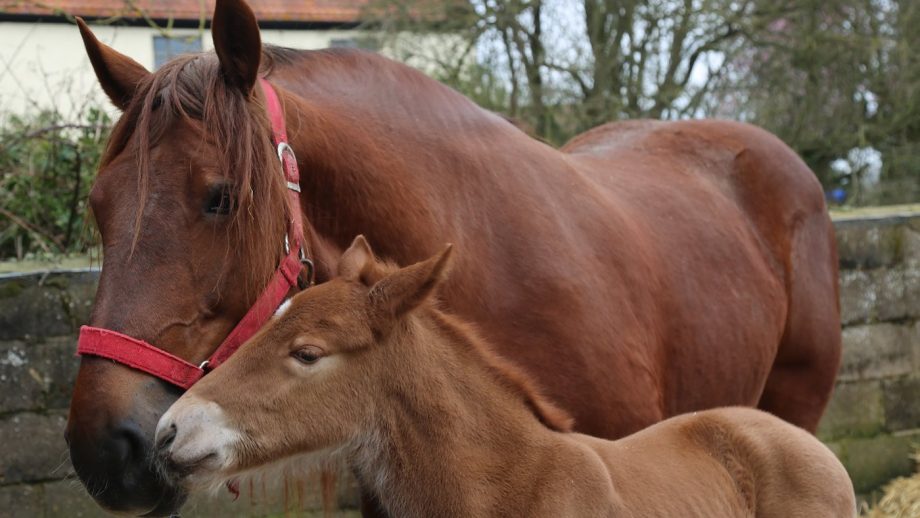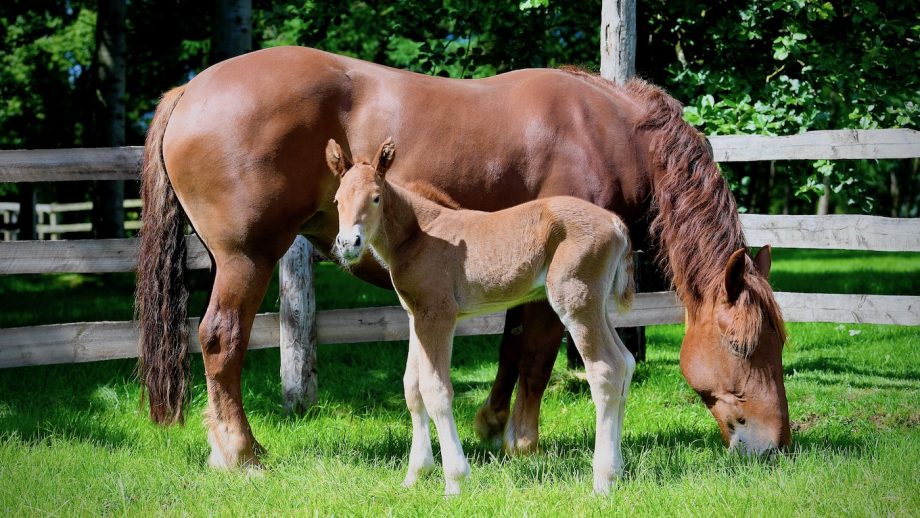Societies and enthusiasts are asking “what’s in your paddock” in the hope of finding more breeding-age members of our rarest equine species. H&H finds out more
OWNERS of pure-bred rare-breed horses are urged to consider breeding from them this year as the fight to save our equine heritage goes on.
Five British horse breeds are listed as critical by the Rare Breeds Survival Trust, which means there are fewer than 300 registered breeding females: Cleveland Bays, Suffolks, Hackneys, Eriskays and Dales.
{"content":"PHA+QnJ1Y2UgTGFuZ2xleS1NY0tpbSBvZiBUaG9ycGVsZXkgU3R1ZCwgd2hpY2ggc3RhbmRzIHJhcmUtYnJlZWQgc3RhbGxpb25zLCBpcyBwdXNoaW5nIHRoZSBjYXRjaHBocmFzZSDigJxZb3VyIGJyZWVkIG5lZWRzIHlvdeKAnS48L3A+CjxwPuKAnEnigJltIGFza2luZywg4oCYV2hhdOKAmXMgaW4geW91ciBwYWRkb2NrP+KAmeKAnSBoZSB0b2xkIDxlbT5IJmFtcDtIPC9lbT4uIOKAnFRoZXNlIGJyZWVkcyBhcmUgZ2V0dGluZyByYXJlciBhbmQgdGhleeKAmXJlIHBhcnQgb2Ygb3VyIGhlcml0YWdlOyBpdOKAmXMgbm90IHJpZ2h0IHRoZXkgc2hvdWxkIGRpZSBvZmYgYmVjYXVzZSB3ZeKAmXZlIG1hZGUgdGhlbSByZWR1bmRhbnQgYW5kIHRoZW4gZG9u4oCZdCBhY3QgdG8gc2F2ZSB0aGVtLuKAnTwvcD4KPHA+TXIgTGFuZ2xleS1NY0tpbSBhZGRlZCB0aGF0IGlmIGhvcnNlcyBjaGFuZ2UgaGFuZHMsIG9yIGRpZSwgYW5kIHBhc3Nwb3J0cyBhcmUgbm90IHVwZGF0ZWQsIHRoZXkgY2FuIGRyb3Agb3V0IG9mIHRoZSBzeXN0ZW0sIHNvIGJyZWVkIHNvY2lldGllcyBkbyBub3Qga25vdyB0aGUgZnVsbCBwaWN0dXJlLjwvcD4KPHA+PGRpdiBjbGFzcz0iYWQtY29udGFpbmVyIGFkLWNvbnRhaW5lci0tbW9iaWxlIj48ZGl2IGlkPSJwb3N0LWlubGluZS0yIiBjbGFzcz0iaXBjLWFkdmVydCI+PC9kaXY+PC9kaXY+PHNlY3Rpb24gaWQ9ImVtYmVkX2NvZGUtMzEiIGNsYXNzPSJoaWRkZW4tbWQgaGlkZGVuLWxnIHMtY29udGFpbmVyIHN0aWNreS1hbmNob3IgaGlkZS13aWRnZXQtdGl0bGUgd2lkZ2V0X2VtYmVkX2NvZGUgcHJlbWl1bV9pbmxpbmVfMiI+PHNlY3Rpb24gY2xhc3M9InMtY29udGFpbmVyIGxpc3RpbmctLXNpbmdsZSBsaXN0aW5nLS1zaW5nbGUtc2hhcmV0aHJvdWdoIGltYWdlLWFzcGVjdC1sYW5kc2NhcGUgZGVmYXVsdCBzaGFyZXRocm91Z2gtYWQgc2hhcmV0aHJvdWdoLWFkLWhpZGRlbiI+DQogIDxkaXYgY2xhc3M9InMtY29udGFpbmVyX19pbm5lciI+DQogICAgPHVsPg0KICAgICAgPGxpIGlkPSJuYXRpdmUtY29udGVudC1tb2JpbGUiIGNsYXNzPSJsaXN0aW5nLWl0ZW0iPg0KICAgICAgPC9saT4NCiAgICA8L3VsPg0KICA8L2Rpdj4NCjwvc2VjdGlvbj48L3NlY3Rpb24+PC9wPgo8cD5IZSBhbHNvIHdhbnRzIHRvIHByb21vdGUgdGhlIHJhbmdlIG9mIGpvYnMgdGhlIHJhcmUtYnJlZWQgaG9yc2VzIGNhbiBleGNlbCBpbi4gSGUgaHVudHMgYW5kIGhhcyBldmVudGVkIGhpcyA8YSBocmVmPSJodHRwczovL3d3dy5ob3JzZWFuZGhvdW5kLmNvLnVrL3RhZy9zdWZmb2xrLXB1bmNoIj5TdWZmb2xrIDwvYT5zdGFsbGlvbiBDcmFpa2hvdyBIYWxsIEplbnNlbiB0byBzaG93IGhlIGNhbiBkbyBpdCwgd2hpY2ggaGUgdGhpbmtzIGlzIGNydWNpYWwgYXMgd2l0aG91dCBhIG1hcmtldCwgZXNwZWNpYWxseSBmb3IgdGhlIGhlYXZpZXIgaG9yc2VzLCB0aGVyZSBtYXkgYmUgbGVzcyByZWFzb24gdG8gYnJlZWQgdGhlbS48L3A+CjxwPuKAnE90aGVyd2lzZSwgaW4gMjAgeWVhcnMsIHRoZXnigJlsbCBiZSBnb25lLOKAnSBoZSBzYWlkLiDigJxXZeKAmXZlIGdvdCB0aGUgdGVjaCBhbmQgdGhlIHNjaWVuY2UgdG8ga2VlcCB0aGVzZSBicmVlZHMgZ29pbmc7IGl0IGNhbiBiZSBkb25lLCB3ZeKAmXZlIGp1c3QgZ290IHRvIGhhdmUgcGVvcGxlIGNvbWluZyBmb3J3YXJkIHdpdGggaG9yc2VzLuKAnTwvcD4KPHA+Q2xldmVsYW5kIEJheSBIb3JzZSBTb2NpZXR5IGNvdW5jaWwgZGVwdXR5IGNoYWlyIEphY2tpZSBTcGFycm93IHRvbGQgPGVtPkgmYW1wO0g8L2VtPiBzaGUgYWdyZWVzIHdpdGggdGhlIHB1c2ggdG8gYnJlZWQuPC9wPgo8ZGl2IGNsYXNzPSJhZC1jb250YWluZXIgYWQtY29udGFpbmVyLS1tb2JpbGUiPjxkaXYgaWQ9InBvc3QtaW5saW5lLTMiIGNsYXNzPSJpcGMtYWR2ZXJ0Ij48L2Rpdj48L2Rpdj4KPHA+4oCcV2XigJlyZSBzdHJ1Z2dsaW5nIGEgYml0IGJlY2F1c2UgcGVvcGxlIGhhdmUgbWFyZXMgYnV0IGFyZW7igJl0IGJyZWVkaW5nIHRoZW0s4oCdIHNoZSBzYWlkLiDigJxCZWNhdXNlIHRoZXnigJlyZSBjcml0aWNhbGx5IGVuZGFuZ2VyZWQsIHdlIG5lZWQgcHVyZS1icmVkIG1hcmVzIHRvIGdvIHRvIHB1cmUtYnJlZCBzdGFsbGlvbnMsIGFuZCBhIGxvdCBvZiBwZW9wbGUgbWF5IG5vdCByZWFsaXNlIHRoZSBnZW5ldGljIHZhbHVlIG9mIHRoZWlyIGhvcnNlcy7igJ08L3A+CjxwPk1zIFNwYXJyb3cgc2FpZCB0aGUgc29jaWV0eSBmb3VuZCBpbiBhIHN1cnZleSB0aGF0IHRoZXJlIGFyZSBvbmx5IDg0IG1hcmVzIGluIHRoZSBicmVlZGluZyBwcm9ncmFtbWUgaW4gdGhpcyBjb3VudHJ5LCBhbmQgYSB0b3RhbCBvZiBhYm91dCAzMDAgd29ybGR3aWRlLjwvcD4KPGRpdiBjbGFzcz0iYWQtY29udGFpbmVyIGFkLWNvbnRhaW5lci0tbW9iaWxlIj48ZGl2IGlkPSJwb3N0LWlubGluZS00IiBjbGFzcz0iaXBjLWFkdmVydCI+PC9kaXY+PC9kaXY+CjxwPuKAnEl04oCZcyB0aGF0IGJhZCzigJ0gc2hlIHNhaWQuIOKAnFdlIHJlYWxseSBuZWVkIHBlb3BsZSB3aG8gaGF2ZSBwdXJlLWJyZWQgbWFyZXMgdG8gdGhpbmsgYWJvdXQgbGV0dGluZyB0aGVtIGhhdmUgYSBwdXJlLWJyZWQgZm9hbCwgbmF0dXJhbGx5IG9yIGJ5IGZyZWV6aW5nIG9mIGVtYnJ5b3Mgb3IgZW1icnlvIHRyYW5zZmVyLi4gVGhlIGJyZWVkIGlzIHNvIHZlcnNhdGlsZTsgdGhleSBqdW1wLCBldmVudCwgZG8gcmVhbGx5IGdvb2QgZHJlc3NhZ2UgYW5kIGRvIGEgbG90IG9mIGVuZHVyYW5jZSBpbiB0aGUgVVMuPC9wPgo8cD7igJxXZSBuZWVkIHRvIGtub3cgd2hlcmUgdGhlIG1hcmVzIGFyZS4gQW55b25lIHdpdGggb25lLCBwbGVhc2UgY29udGFjdCB0aGUgc29jaWV0eSBzbyB3ZSBjYW4gbWFrZSBzdXJlIHRoZXnigJlyZSBhdCBsZWFzdCBpbiB0aGUgZ2VuZXRpYyBkYXRhYmFzZS7igJ08L3A+CjxkaXYgY2xhc3M9ImFkLWNvbnRhaW5lciBhZC1jb250YWluZXItLW1vYmlsZSI+PGRpdiBpZD0icG9zdC1pbmxpbmUtNSIgY2xhc3M9ImlwYy1hZHZlcnQiPjwvZGl2PjwvZGl2Pgo8cD5NcyBTcGFycm93IGFsc28gdXJnZWQgb3duZXJzIG9mIGNvbHRzIHRvIGdldCBpbiB0b3VjaCwgYXMgc2VtZW4gY2FuIGJlIHByZXNlcnZlZCBmcm9tIHRlc3RlcyBhZnRlciBnZWxkaW5nLiBUaXNzdWUgYmFua2luZyB0byBoYXJ2ZXN0IEROQSBmcm9tIGRlY2Vhc2VkIGhvcnNlcyBmb3IgcG9zc2libGUgZnV0dXJlIDxhIGhyZWY9Imh0dHBzOi8vd3d3LmhvcnNlYW5kaG91bmQuY28udWsvdGFnL2Nsb25pbmciPmNsb25pbmc8L2E+IGhhcyBhbHNvIHJlY2VudGx5IHN0YXJ0ZWQuPC9wPgo8cD5TdWZmb2xrIEhvcnNlIFNvY2lldHkgY2hhaXJtYW4gTWFyayBEb25zd29ydGggc2FpZCB0aGUgc29jaWV0eSBoYXMganVzdCBjb21wbGV0ZWQgYSBjZW5zdXMsIGluIGEgZHJpdmUgdG8gZmluZCBvdXQgZXhhY3QgbnVtYmVycywgYW5kIHRoZXJlIGFyZSBmZXdlciB0aGFuIDcwIGJyZWVkaW5nLWFnZSBtYXJlcyBsZWZ0LjwvcD4KPHA+4oCcTGFzdCB5ZWFyLCB3ZSBicmVkIDMyIGZvYWxzOyB0aGF04oCZcyBob3cgY3JpdGljYWwgdGhpbmdzIGFyZSzigJ0gaGUgdG9sZCA8ZW0+SCZhbXA7SC48L2VtPjwvcD4KPHA+SGUgYWRkZWQgdGhhdCBmb3IgYW55b25lIHdhcnkgb3IgbmVydm91cyBvZiBicmVlZGluZywgdGhlIHNvY2lldHkgaGFzIGFkdmlzZXJzIGFuZCBleHBlcnRzIHRvIGhlbHAgYXQgZXZlcnkgc3RhZ2Ugb2YgdGhlIHByb2Nlc3MsIGFzIHdlbGwgYXMgZ3JhbnRzIHRvd2FyZHMgYnJlZWRpbmcsIGFuZCB3ZWJpbmFycyB0aGF0IHdpbGwgYmUgdXBsb2FkZWQgdG8gdGhlIHNvY2lldHnigJlzIHdlYnNpdGUgZWFybHkgbmV4dCB5ZWFyLjwvcD4KPHA+4oCcV2Ugc3BlbnQgwqMzMCwwMDAgaGVscGluZyBicmVlZGVycyB0aGlzIHllYXI7IGFuZCBmb3IgYW55b25lIHdpdGggZG91YnRzLCB3ZeKAmXZlIGdvdCBwZW9wbGUgZGVsaWdodGVkIHRvIGhlbHAs4oCdIGhlIHNhaWQuPC9wPgo8ZGl2IGNsYXNzPSJpbmplY3Rpb24iPjwvZGl2Pgo8cD7igJxJIGNhbuKAmXQgdGVsbCB5b3UgaG93IGltcG9ydGFudCB0aGlzIGlzLiBTdWZmb2xrcyBhcmUgcmFyZXIgdGhhbiBnaWFudCBwYW5kYXM7IHRoZXJlIHdhcyBhIHN1Z2dlc3Rpb24gdGhlIGJyZWVkIG1pZ2h0IGRpZSBvdXQgaW4gMTAgeWVhcnMgaWYgc29tZXRoaW5nIHdhc27igJl0IGRvbmUuPC9wPgo8cD7igJxXZeKAmXJlIGRvaW5nIG91ciBiZXN0IGFuZCBhcmUgbG9va2luZyBhdCBvcHBvcnR1bml0aWVzIGxpa2UgPGEgaHJlZj0iaHR0cHM6Ly93d3cuaG9yc2VhbmRob3VuZC5jby51ay9uZXdzL3JhcmUtc3VmZm9say1tYXJlLWZvYWwtdGhhbmtzLWlubm92YXRpdmUtc2V4ZWQtc2VtZW4tdGVjaG5vbG9neS02OTUwMTYiPnNleGVkIHNlbWVuPC9hPiB0byBicmVlZCBmaWxsaWVzLCBhbmQgYWxsIHNvcnRzIG9mIHNjaWVudGlmaWMgYWR2YW5jZXMsIGJ1dCBmdW5kYW1lbnRhbGx5LCB3ZSBuZWVkIG93bmVycyBhbmQgYnJlZWRlcnMgdG8gaGVscCB1cy48L3A+CjxwPuKAnElmIHRoZXJl4oCZcyBhIG1hcmUgb3V0IHRoZXJlIGFuZCB3ZSBjYW4gaGVscCwgaXTigJlzIGNydWNpYWwu4oCdPC9wPgo8cD4K"}
You might also be interested in…
‘Hopefully this may be a way to stop these breeds from disappearing’
Credit: Suffolk Horse Society
Credit: Revive & Restore
Adam Henson and Prince Charles.
Credit: RBST
Curly ears, “blonde” manes and self-fracturing hooves are distinctive features of some of the world’s more unusual breeds. Martha Terry
Tullis Matson with the foal and Dr Gareth Starbuck with the mare, Ruby.
Credit: Stallion AI Services
‘The birth of this foal marks a major step towards securing the future of the Suffolk horse and all other
Stay in touch with all the news in the run-up to and throughout the major shows and events during 2025 and beyond with a Horse & Hound subscription. Subscribe today for all you need to know ahead of these major events, plus online reports on the action as it happens from our expert team of reporters and in-depth analysis in our special commemorative magazines. Have a subscription already? Set up your unlimited website access now
H&H news editor
Eleanor is an experienced journalist who spent over eight years working for local and national newspapers before joining H&H as news editor in March 2016. Passionate about equine welfare and exposing the truth, Eleanor has reported on all aspects of the industry, from Brexit to anti-bullying campaigns, and from dressage rules to mules. Her sport of choice is showjumping, in which she competes her own horses, and she also enjoys reporting at local jumping shows through to international championships.







